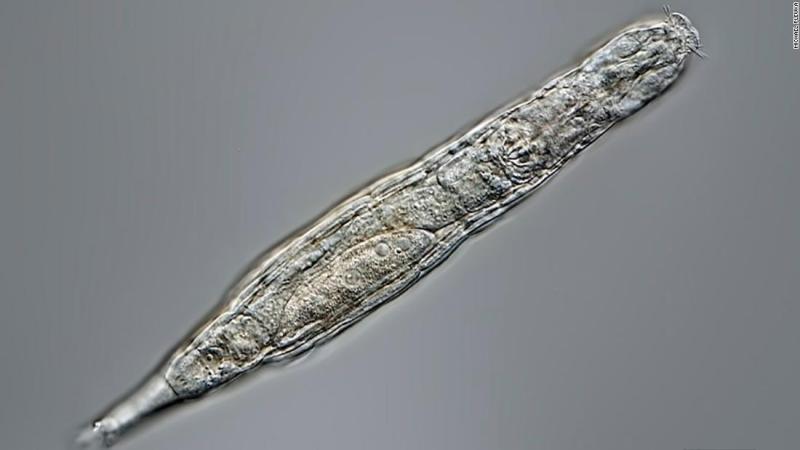Bdelloid rotifers survived 24,000 years frozen in the Siberian permafrost - CNN


Simply astonishing !

(CNN)A microscopic animal has been revived after slumbering in the Arctic permafrost for 24,000 years.
Bdelloid rotifers typically live in watery environments and have an incredible ability to survive. Russian scientists found the creatures in a core of frozen soil extracted from the Siberian permafrost using a drilling rig. "Our report is the hardest proof as of today that multicellular animals could withstand tens of thousands of years in cryptobiosis, the state of almost completely arrested metabolism," said Stas Malavin, a researcher at the Soil Cryology Laboratory at the Pushchino Scientific Center for Biological Research in Russia. Rotifers have an incredible ability to survive harsh environments. Earlier researchby other groups had shown that the rotifers could survive up to 10 years when frozen. In a new study, the Russian researchersused radiocarbon dating to determine that the critters they recovered from the permafrost -- ground that is frozen year-round, apart from a thin layer near the surface -- were about 24,000 years old. The study was published in the journal Current Biology on Monday. Read More It's not the first time ancient life has been resurrected from a permanently frozen habitat. Mysteries of massive holes forming in Siberian permafrost unlocked by scientistsStems of Antarctic moss were successfully regrown from a 1,000-year-old sample that had been covered by ice for about 400 years, and a living campion flower was regenerated from seed tissue, likely stored by an Arctic squirrel, that had been preserved in 32,000-year-old permafrost. Simple worms, called nematodes, were revived from the permafrost from two places in northeastern Siberia, in sediments that were more than 30,000 years old. Long-dead but well-preserved mammals, including extinct cave bears and mammoths, have also been unearthed from the permafrost, which is thawing in some places as aresult of the climate crisis. World's oldest DNA sequenced from a mammoth that lived more than a million years ago Malavin said that it is highly unlikely bigger life forms could survive being frozen in this way. "The takeaway is that a multicellular organism can be frozen and stored as such for thousands of years and then return back to life -- a dream of many fiction writers," Malavin said in the statement. Preserved woolly rhino unearthed in Russian Arctic "Of course, the more complex the organism, the trickier it is to preserve it alive frozen and, for mammals, it's not currently possible. Yet, moving from a single-celled organism to an organism with a gut and brain, though microscopic, is a big step forward." Once the rotifer thawed, the creature was able to reproduce, the study said. The tiny invertebrates were also able to feed. Sign up for CNN's Wonder Theory science newsletter. Explore the universe with news on fascinating discoveries, scientific advancements and more. To understand how the creature survived in suspended animation in the frozen ground, the researchers froze and thawed modern day rotifers living in permafrost regions. They found that the creatures could withstand the formation of ice crystals while they were slowly frozen. While not all the rotifers survived the freezing process, the study suggested that the creatures have some mechanism that can can shield their cells and organs from harm at very low temperatures.



It staggers my imagination.
Wow, amazing.
Mr. Bdelloid : Honey I'm hooome.
Mrs. Bdelloid : About time ya Bastahd ! Yer 23,999 years, 11 months, 29 days and 5 hours late and ya dinner's cold as ice.
Mrs. Bdelloid.... And don't try the flowers routine.